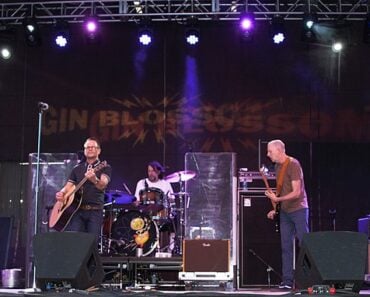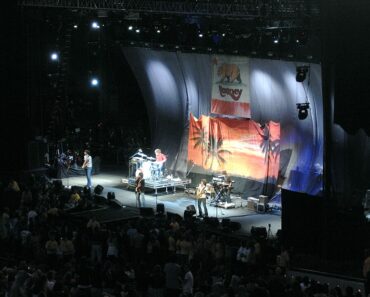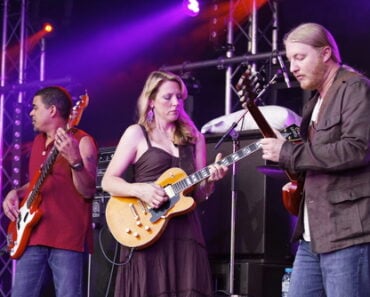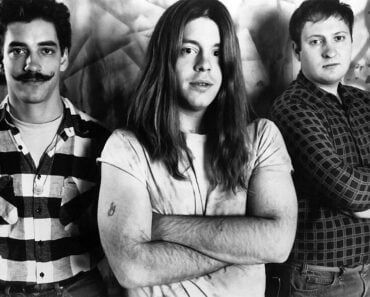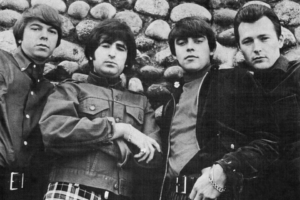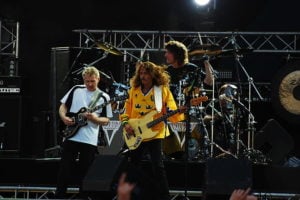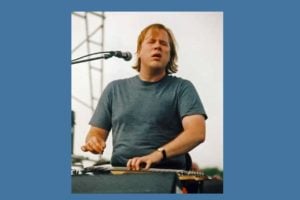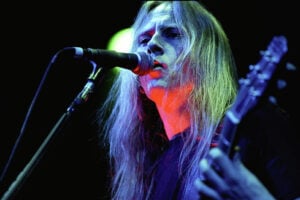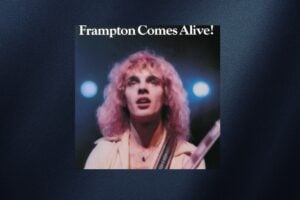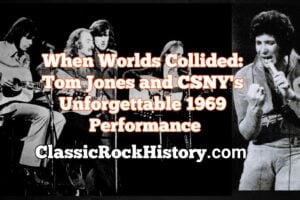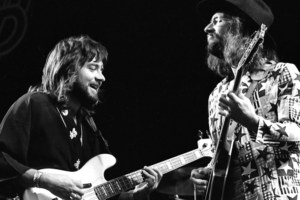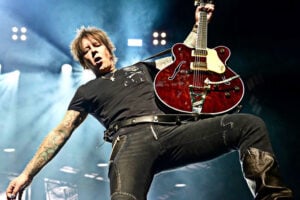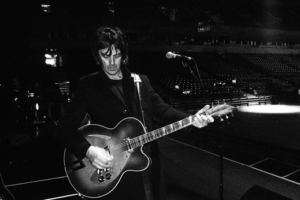
Feature Photo: Aphasia83, CC BY-SA 3.0 <https://creativecommons.org/licenses/by-sa/3.0>, via Wikimedia Commons
Rising from the Stockholm suburbs under their original moniker Force, the Swedish rock collective that would eventually become known as Europe has undergone numerous lineup transformations since their inception in 1979. The band obtained a major breakthrough in Sweden in 1982 by winning the televised competition Rock-SM (Swedish Rock Championships), launching a career that has spanned over four decades. Since their formation, Europe has released eleven studio albums, three live albums, three compilations and twenty-four music videos.
Europe rose to international fame in the 1980s with their third album, 1986’s The Final Countdown, which became a global phenomenon and established their place in rock history. Europe has sold over 25 million records worldwide and achieved significant chart success with two top 20 albums on the Billboard 200 chart (The Final Countdown and Out of This World) and three top 30 singles on the Billboard Hot 100 chart.
Europe went on hiatus in 1992, reunited temporarily for a one-off performance in Stockholm on New Year’s Eve 1999 and announced an official reunion in 2003. The band has continued to evolve musically while maintaining their core identity, proving their lasting power in the international rock scene.
Joey Tempest
Born Rolf Magnus Joakim Larsson on August 19, 1963, Joey Tempest has remained the constant vocal force of Europe throughout their entire career. He created the stage name “Joey Tempest” in 1979, inspired by William Shakespeare’s tragicomedy The Tempest as well as the song “Sparks of the Tempest” by American progressive rock band Kansas. Tempest formed the band Force with guitarist John Norum, bassist Peter Olsson and drummer Tony Reno in the Stockholm suburb of Upplands Väsby.
During Europe’s early years, Tempest wore multiple hats as both vocalist and keyboardist. He played the keyboards on the first two Europe albums before the band decided to recruit keyboardist Mic Michaeli in April 1984. This change allowed Tempest to focus entirely on his vocal performance and stage presence, which became crucial to the band’s live appeal.
Tempest’s songwriting prowess became evident early in the band’s career and would define their greatest successes. “The Final Countdown” became their signature achievement, topping the sales chart in 26 countries and selling 15 million copies. The song was played at the closing ceremony of the 1987 EuroBasket and 1988 Summer Olympics and became the musical theme of the millennium celebrations.
Beyond his work with Europe, Tempest maintained a successful solo career during the band’s hiatus period from 1992 to 2003. His debut solo effort, A Place to Call Home, was released in 1995 and went platinum in Sweden while selling well internationally. This was followed by Azalea Place in 1997 and a self-titled album in 2002, with several songs on the third album co-written by Europe bandmate Mic Michaeli.
In recent years, Tempest has expanded his collaborative efforts beyond Europe and his solo work. In 2024, he appeared on Swedish progressive rock and metal band Opeth’s album The Last Will and Testament, providing guest backing vocals. He currently resides in London with his family and remains actively involved in Europe’s ongoing activities.
John Norum
John Norum stands as one of the founding members and the original guitarist who helped shape Europe’s distinctive sound during their most commercially successful period. Born on February 23, 1964, Norum co-founded Force alongside Joey Tempest in 1979 and remained with the band through their transformation into Europe and their rise to international stardom.
The band’s early success was built on Norum’s guitar foundation. In 1982, when Tempest’s girlfriend entered Force in the Swedish rock talent contest Rock-SM, they competed against 4000 bands and won thanks to two songs, “In the Future to Come” and “The King Will Return.” Norum won the individual award for Best Guitarist, establishing his reputation early in his career.
His guitar work was instrumental in defining Europe’s sound on their first three albums, including the breakthrough success of The Final Countdown. However, creative differences led to his departure in October 1986. “I didn’t really like the direction the band was going in,” Norum explained. “We became this teeny-bopper, bubblegum band and I hated that whole image, the spandex, poodle-rock type of thing. I was more into the heavier, guitar-oriented stuff and it seemed like the keyboards were taking over more and more.”
Following his departure, Norum pursued a successful solo career, releasing multiple albums and collaborating with various artists. His solo work showcased a heavier, more blues-influenced style that reflected his personal musical preferences. He maintained some connection to his Europe roots through collaborations, including working with Tempest on the single “We Will Be Strong” from Norum’s album Face the Truth in 1992.
When Europe reunited in 2003, Norum returned as the sole guitarist, and the band switched back to The Final Countdown lineup. His return marked a new chapter for the band, contributing to their continued success and creative evolution into the 21st century.
Peter Olsson
Peter Olsson served as Europe’s original bassist during their formative years as Force, playing a crucial role in the band’s early development from 1979 to 1981. The first incarnation of the band came together in Upplands Väsby, Stockholm, with Olsson joining vocalist Joey Tempest, guitarist John Norum, and drummer Tony Reno as the founding quartet.
During his tenure with the band, Olsson contributed to their early sound and helped establish their presence in the Stockholm rock scene. However, as the band’s ambitions grew and their musical standards evolved, limitations in Olsson’s playing became apparent. As John Levén later explained when discussing his joining the band, “Peter Olsson had played a big part in putting Force together. The trouble was that he wasn’t a great musician. Force had become really popular, even though they had a bassist that couldn’t play.”
Olsson left the band in 1981 and was replaced by John Levén. He briefly returned for a short period when Levén temporarily joined Yngwie Malmsteen’s Rising Force, but this arrangement lasted only three months before Levén returned permanently to Force/Europe.
Following his time with Europe, Olsson stepped away from the music industry spotlight. Little information is available about his subsequent musical endeavors or career path outside of his foundational contribution to what would become one of Sweden’s most successful rock bands.
Tony Reno
Tony Reno, born Tony Niemistö, served as Europe’s original drummer during their early years as Force and into their initial transformation as Europe from 1979 to 1984. As one of the founding members alongside Joey Tempest, John Norum, and Peter Olsson, Reno was instrumental in establishing the band’s early sound and helping them build their reputation in the Stockholm rock scene.
Reno performed with the band during their crucial developmental period, including their participation in and victory at the Rock-SM competition in 1982 that launched their professional career. This victory was significant not only for the band’s future but also established the individual talents within the group, with both Tempest and Norum receiving individual awards.
However, as the band evolved and their commitment levels intensified, issues arose with Reno’s dedication to the group. Tony Reno was fired in 1984 because of his lack of motivation and alleged slacking off on rehearsals. According to bassist Peter Olsson, Reno was even replaced by a drum machine on some album recordings, suggesting that his drumming contributions had become problematic before his official departure.
His replacement was Ian Haugland in 1984, who brought the energy and commitment that the band required as they prepared for their international breakthrough. After leaving Europe, Reno largely disappeared from the public music scene, and there is limited information available about his subsequent career or musical activities.
Marcel Jacob
Marcel Jacob had a brief but notable stint as Europe’s bassist during a transitional period in 1981, serving as a temporary replacement when the band was still operating under the name Force. Jacob’s involvement with the band occurred during a period of significant lineup changes, when John Levén had temporarily left to join Yngwie Malmsteen’s Rising Force.
Jacob stepped in when the band needed a bassist, as Malmsteen’s former bassist filled the role that Levén had vacated. However, this arrangement proved to be short-lived. After only three months, Levén apparently had issues with Malmsteen and decided to return to Force, leading Jacob to trade places back to Malmsteen’s band.
During his brief time with Force, Jacob contributed to their continued development as they prepared for what would become their breakthrough period. Although his tenure was short, it demonstrated the fluid nature of the Swedish rock scene at the time and the interconnected relationships between various bands and musicians.
Following his brief period with Europe, Jacob went on to have a successful career in the Swedish and international metal scene, becoming particularly well-known for his work with the band Talisman and various other projects. His legacy in Swedish rock music was substantial, earning him recognition as one of Sweden’s premier bass players in the hard rock and metal genres.
Tragically, on July 21, 2009, Marcel Jacob committed suicide at the age of 45. His death was a significant loss to the Swedish rock and metal community, where he was respected as a talented musician who had contributed to numerous successful recordings and live performances throughout his career.
John Levén
John Levén has served as Europe’s bassist since 1981 and represents one of the band’s most consistent and enduring members, having performed on every studio album in the band’s catalog. Born John Gunnar Levén on October 25, 1963, in Stockholm, he joined the band in 1981, replacing Peter Olsson during their Force era. When he was seven years old, his family moved to the suburb Upplands Väsby, where several members of Europe grew up.
Levén’s musical journey began early, and his childhood influences shaped his playing style. His first albums were from Kiss and The Sweet, and he later discovered Led Zeppelin, Deep Purple, Rush, Black Sabbath, UFO, and Thin Lizzy. He initially played guitar in various local bands before transitioning to bass when John Norum and Joey Tempest asked him to join their group.
One of Levén’s most significant contributions to Europe’s legacy came in 1985 when he suggested that Tempest should write a song based on an old keyboard riff that the vocalist had written around 1981-82. The result was “The Final Countdown,” which became the band’s signature song and biggest international hit.
During Europe’s hiatus from 1992 to 2003, Levén remained active in the music scene, working with various projects that helped him develop as a musician. He recorded and toured with bands like Brazen Abbot, Clockwise, Last Autumn’s Dream, Southpaw, fellow Europe colleague John Norum, and former Black Sabbath/Deep Purple vocalist Glenn Hughes.
When Europe reunited in 2003, Levén expanded his role in the band’s creative process. He co-wrote the single “Always the Pretenders” from the 2006 album Secret Society with Tempest, demonstrating his growth as a songwriter. His steady presence and musical consistency have been instrumental in maintaining Europe’s identity through their various evolutionary phases.
Mic Michaeli
Mic Michaeli, born Gunnar Mathias Michaeli on November 11, 1962, joined Europe in 1984 and has since become an integral part of the band’s sound and songwriting process. Like many of the other Europe members, he grew up in Stockholm suburb Upplands Väsby, which created a natural connection to the band’s core.
Michaeli joined the band for their Wings of Tomorrow tour in 1984, taking vocalist Joey Tempest’s place behind the keyboards. His addition to the band marked a significant evolution in their sound, allowing Tempest to focus entirely on vocals and stage presence while adding sophisticated keyboard arrangements to their compositions.
His most significant songwriting contribution came with the creation of one of Europe’s biggest hits. Michaeli co-wrote the hit ballad “Carrie” from the album The Final Countdown with Tempest, and it became Europe’s biggest hit in the U.S., reaching number 3 on the Billboard Hot 100 chart. Beyond “Carrie,” Michaeli has contributed to numerous other Europe compositions, helping to define their melodic sensibilities and harmonic complexity.
During Europe’s hiatus period from 1992 to 2003, Michaeli pursued various musical projects that expanded his artistic horizons. He recorded and toured with bands like Brazen Abbot, Last Autumn’s Dream, and former Black Sabbath/Deep Purple vocalist Glenn Hughes. His work with Glenn Hughes was particularly notable, as it allowed him to explore different musical styles and work with a legendary vocalist.
Michaeli also maintained his creative partnership with Joey Tempest during the band’s inactive period. He co-wrote three songs on Tempest’s third solo album, Joey Tempest, which was released in 2002, demonstrating their continued musical chemistry even outside the Europe framework.
Since Europe’s reunion in 2003, Michaeli has remained a driving force in their creative process. He has contributed to their continued evolution and helped them maintain their relevance in the contemporary rock scene, with his keyboard work remaining central to the band’s distinctive sound.
Ian Haugland
Ian Haugland, born Jan-Håkan Haugland on August 13, 1964, in Norway, became Europe’s drummer in 1984 and has been a cornerstone of the band’s rhythm section ever since. When he was eight months old, his family moved to the Stockholm suburb of Märsta, Sweden, where he developed his musical interests and eventually became part of the Swedish rock scene.
Haugland joined Europe in the summer of 1984, replacing Tony Reno at a crucial time as the band was preparing for their international breakthrough. His timing was perfect, as his energy and commitment aligned with the band’s increasing professional demands and ambitions.
Before joining Europe, Haugland had gained valuable experience with other notable bands and projects. He had played in several bands, including Trilogy, where Candlemass bassist Leif Edling sang, and Yngwie J. Malmsteen’s band Rising Force. This experience with high-profile musicians helped prepare him for the demands of working with Europe during their most successful period.
His drumming style and energy became integral to Europe’s sound during the recording of The Final Countdown and subsequent albums. Haugland’s powerful and precise playing provided the rhythmic foundation that supported the band’s increasingly sophisticated compositions and arrangements.
During Europe’s hiatus from 1992 to 2003, Haugland remained highly active in the music industry. He recorded and toured with bands like Brazen Abbot, Clockwise, Last Autumn’s Dream, fellow Europe colleague John Norum, and former Black Sabbath/Deep Purple vocalist Glenn Hughes. In 1998, he recorded a cover version of the Black Sabbath song “Changes” for the Ozzy Osbourne tribute album Ozzified.
Beyond his drumming career, Haugland has diversified his professional activities. When he’s not on the road or in the studio, he works as a host on the radio channel 106.7 FM Rockklassiker in Stockholm. This radio work has allowed him to stay connected to the music industry and share his knowledge and passion for rock music with audiences in Sweden.
Kee Marcello
Kee Marcello, born Kjell Hilding Lövbom on February 20, 1960, served as Europe’s guitarist from 1986 to 1992, replacing John Norum during the band’s commercial peak and contributing to some of their most successful albums. His arrival came at a critical juncture when the band needed to maintain their momentum following Norum’s departure.
Before joining Europe, Marcello had established himself in the Swedish rock scene through various bands. He played in groups such as Stetson Cody Group, Norbom Hilke, and Noice before forming Easy Action in 1982. Easy Action achieved significant success, becoming the first Scandinavian band to sign a worldwide major label deal with a US label through Warner’s Sire Records in 1983.
Marcello’s connection to Europe predated his membership in the band. He had previously collaborated with Europe vocalist Joey Tempest on the hugely successful single “Give a Helpin’ Hand” for the charity project Swedish Metal Aid. He also produced this platinum-selling record, which gave Tempest his first hit single and likely influenced the decision to ask Marcello to become the new guitarist.
When Kee Marcello was asked to replace Norum, he joined the band at its commercial peak. With Europe, Marcello recorded two studio albums that achieved significant commercial success: Out of This World and Prisoners in Paradise. His guitar work on these albums helped maintain Europe’s commercial momentum and showcased his ability to blend with the band’s established sound while adding his own musical personality.
Following Europe’s hiatus in 1992, Marcello pursued an extensive solo career and various musical projects. He embarked on his solo career in 1995 with the release of his first solo album Shine On, and has continued releasing solo material, with his fifth album Scaling Up released by Frontiers Records in October 2016.
When Europe reunited in 2003 with John Norum, Marcello decided not to be part of the reunion, choosing instead to focus on his solo career and other musical endeavors. Since leaving Europe, he has remained active in the music industry through various projects, collaborations, and solo releases, establishing himself as a respected guitarist beyond his association with Europe.
Check out more Europe articles on ClassicRockHistory.com Just click on any of the links below……
Top 10 Europe Songs
Complete List Of Europe Albums And Discography
Read More: Artists’ Interviews Directory At ClassicRockHistory.com
Read More: Classic Rock Bands List And Directory


